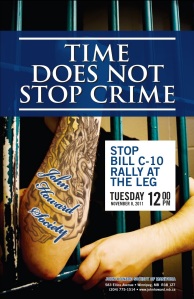The John Howard Society of Manitoba is organizing a rally to stop Bill C-10 (November 8, 12pm, at the Leg). For more information about this bill, see their fact sheet, below.
By the John Howard Society of Manitoba
Bill C-10, an omnibus bill, contains nine separate pieces of previously failed legislation. In addition to creating a number of new mandatory minimum sentences for a wide variety of offences, it increases the use of denunciation and longer sentences for young offenders, makes it easier for the Minister of Public Safety to deny Canadians incarcerated in other countries transfers back to Canada to complete their sentences here, and would delay or deny pardons outright for hundreds of thousands of Canadians with a criminal record.
As well, the Bill calls for a minimum sentence of nine months in jail for anyone found growing six or more pot plants, and would impose the same sentence for someone caught giving away as little as a single joint (which would count as trafficking, even if no money was involved).
The federal government and its supporters have not introduced any evidence to support its claims that Bill C-10 will reduce crime – and are simply ignoring 30 years of evidence from the United States showing that locking up more people, for longer, does not reduce crime.
Although it was introduced by the Federal Government, if passed, Bill C-10 would force the provincial governments to lock up more inmates, increasing overcrowding in provincial jails and further clogging up the courts. John Howard Society of Manitoba has calculated that three-fourths of the increased costs resulting from this Bill will have to be borne by the provinces, and only one-fourth by the federal government – and of course 100 percent of the cost will ultimately be borne by tax-payers.
The government has not released any credible figures in terms of the costs; however based on previous legislation, the John Howard Society of Manitoba calculates the costs to be about $2 billion a year in total (including both federal and provincial costs), or $1400 per tax-payer.
The Provinces of Newfoundland and Labrador, Quebec and Ontario have all spoken out against the Bill, as has the official opposition in British Columbia. Even New Brunswick, which supports the Bill, has said it can’t afford to pay the costs.
In brief, Bill C-10:
- Will not reduce crime, while diverting billions of dollars from healthcare, education, social services as well as strategies already proven to be effective at reducing crime.
- Will make it harder or even impossible for someone with a criminal record to get a pardon and move forward with their life in a positive, crime-free way.
- Will dramatically increase violence in prisons and jails, increasing risks for both inmates and staff. It will also make it harder, if not impossible, to offer programs in jails and prisons to help inmates rehabilitate themselves.
Other Voices
“I went from robbing 7-11 stores, robbing drug dealers, escaping from jail, to becoming a good father, a good member of society, a good taxpayer, a role model to other individuals that are facing the same challenge that I am,” said Chris Courchene, a 29-year-old Aboriginal man from Winnipeg, Canada’s violent crime capital according to Statistics Canada. “I feel that the proposed legislation paints everyone with the same brush. I think that the pardons should be for people who have clearly demonstrated without a doubt that they have reformed.” (At a press conference in Ottawa, ON October)
Wilma Derksen told the committee that finally hearing the truth about what happened to her daughter was a relief but the sentencing did not satisfy her need for justice. “The trial brought out the truth and it was the truth that healed us and set us free, not the sentencing. I still find no satisfaction in thinking that the man will be sitting in prison for the next 25 years. There is nothing life-giving about that. It’s just sad. And it’s going to cost us $2.5 million, probably.” (November 3, 2011, speaking to a House of Commons Standing Committee).
“If there is one common feature of these bills, it’s the ignoring, marginalizing and mischaracterizing of the evidence. The Government holds out the crime bill as a purported means of crime reduction, yet studies show that the resulting prison overcrowding and use of mandatory-minimum sentences will ultimately result in more crime.” (Irwin Cotler, Member of Parliament for Mount Royal and the Liberal critic for justice and human rights – Montreal Gazette, November 4, 2011)
About 13 per cent of the male inmate population is ‘double-bunked’ – housed in cells built for one person – and, under Bill C-10, that will increase to 30 per cent. “Prison overcrowding undermines nearly everything that can be positive or useful about a correctional environment,” Pierre Mallette, the head of the Union of Canadian Correctional Officers, said. “It is linked to increased levels of institutional violence, is a contributing factor to the spread of infectious disease and reduces already limited access to correctional programming and delays the safe and timely reintegration of offenders into the community.” (Montreal Gazette, November 4, 2011)
“If the prime minister’s tough-on-crime rules end up creating more ex-cons, and more hardened ex-cons, increasing the portion of our population with mental illnesses, poorer health, chronic unemployment, homelessness and family break ups, those are costs that are going to hit the provinces harder in their health care budgets and social support program budgets – and for years longer than the actual incarcerations.” (Kevin Libin, National Post, November 4, 2011)
Felix Collins, Newfoundland’s province’s justice minister, said he has never seen a study that favours more prison time as a way to cut rates of re-offence and improve public safety. “Incarcerating more people is not the answer,” Mr. Collins said (Globe and Mail, November 3, 2011).
The John Howard Society works with victims, offenders and communities to respond to the causes and consequences of crime.



